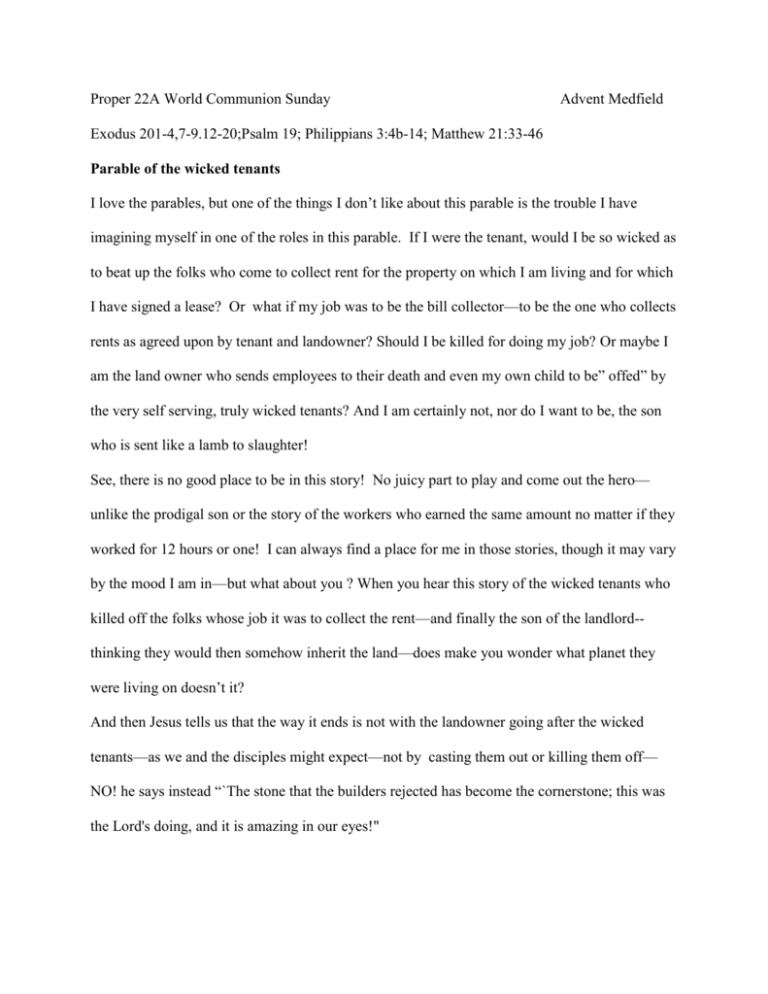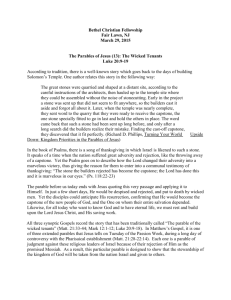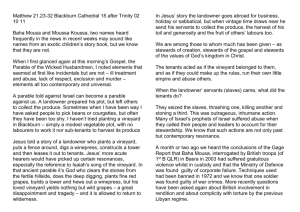Proper 22A World Communion Sunday Advent Medfield Exodus 201
advertisement

Proper 22A World Communion Sunday Advent Medfield Exodus 201-4,7-9.12-20;Psalm 19; Philippians 3:4b-14; Matthew 21:33-46 Parable of the wicked tenants I love the parables, but one of the things I don’t like about this parable is the trouble I have imagining myself in one of the roles in this parable. If I were the tenant, would I be so wicked as to beat up the folks who come to collect rent for the property on which I am living and for which I have signed a lease? Or what if my job was to be the bill collector—to be the one who collects rents as agreed upon by tenant and landowner? Should I be killed for doing my job? Or maybe I am the land owner who sends employees to their death and even my own child to be” offed” by the very self serving, truly wicked tenants? And I am certainly not, nor do I want to be, the son who is sent like a lamb to slaughter! See, there is no good place to be in this story! No juicy part to play and come out the hero— unlike the prodigal son or the story of the workers who earned the same amount no matter if they worked for 12 hours or one! I can always find a place for me in those stories, though it may vary by the mood I am in—but what about you ? When you hear this story of the wicked tenants who killed off the folks whose job it was to collect the rent—and finally the son of the landlord-thinking they would then somehow inherit the land—does make you wonder what planet they were living on doesn’t it? And then Jesus tells us that the way it ends is not with the landowner going after the wicked tenants—as we and the disciples might expect—not by casting them out or killing them off— NO! he says instead “`The stone that the builders rejected has become the cornerstone; this was the Lord's doing, and it is amazing in our eyes!" I know what this means because I read the study materials about it—but even that is not so clear without reading up on it—it is presumed to mean that the Landowner now is God and the Son is Jesus and just as he was rejected by the religious leaders and people of his time and killed in collusion with the political leaders of the day, it was not the end of the story—because he rose again to give salvation and life to all –even the ones who had killed him. The rejected one becomes the salvific one. The meaning of this parable is that the religious ones—the ones like you and even more like me who have spent a lifetime serving in the religious business of church—we are the ones who this parable infers are in trouble—the implication is that the tenants –are us! I don’t know about you, but that is difficult for me to hear! When I was in Jerusalem some 23 years ago, I went to the church, the church of the resurrection, built over the place where Jesus was crucified, Golgotha, buried (the cave tomb) and rose again—that place of resurrection is marked by an incredibly ornate chapel from which the first light of Easter is brought out by Roman, Coptic and Orthodox bishops each year.. So, Tradition has it that Jesus was crucified in a quarry of rejected stones—the ones not good enough to be used for the many buildings the Romans were building all over the middle east— The pile of the flawed stones created the hill where the uprights for the crosses of the condemned were fixed—and the condemned were then affixed to the cross bar and hoisted onto the upright in that rejected stone—making this quotation a literal statement of THE rejected stone, Jesus —who, upon resurrection, becomes the chief cornerstone of our lives. It was quite amazing to be in that place of tradition and hear this story there—and even if we cannot prove it is the exact spot where the events of Holy Week took place—the pilgrims have made it holy over the years…and the incredible beauty and sheer volume of spiritual seekers who visit each year makes it easy to forget what happened and what our role, had it happened in our day and time, might have been. For you see, The folks who rejected that chief cornerstone were just like you and me—religious, faithful, good hearted, folks who let it happen to one of their own because standing with Jesus would have been too costly to them in some way. Even today, the beauty of the church over the place of Jesus’ death somehow allows us to hide from the question this parable begs us to ask, “Would I, like the tenants, really have crucified Jesus?” That we might never have to answer that question “yes”, we need to guard ourselves against being the ones who cannot see new ideas and ways of doing things as the holy because it doesn’t look the way we have always understood it or done it —as the religious leaders of Jesus day certainly did! It's easy for us to look back and see how THEY missed it, but what about us? What do we miss in our own day that people in future generations will look at us and say—“why didn’t THEY get it?” The first century religious folks knew their stuff, but Jesus was telling their story in a new way that threatened their way of life. He spoke in parables instead of laws, he demanded they care for the poor. He even spoke of love and reconciliation and forgiveness as THE way of life—not the laws that they so carefully knew how to live by—forgetting the intent of those laws and living instead by their letter so that they could insure their own righteousness. This parable begs us to keep asking ourselves, “What are the old ways that we cling to so fiercely that we cannot see the presence of Christ in the new? You here at Advent are about to embark on a new way of being church in this place—your new rector will soon arrive—and when that happens, things will change –that is absolutely and unalterably true….and you might find that you are a bit uncomfortable or even angry and that the very thing you love most about being here, or that which you thought of as unchangeable is shifting in the sands. Some of you may even be tempted to metaphorically “kill the messenger” to keep things here the way they always has been. It is my hope and prayer that will not come to pass! No wicked tenants here! No desperately clinging to what was or the way things used to be or the way you have always done it---I believe having Libby here helped you to let go of such natural human inclinations—and you have elected very fine leadership to support your new rector and all of you as this time of transition continues. But it might not hurt to keep a little reminder of this parable of the wicked tenants in the back of your minds as you go forward –hopefully it will help you laugh at yourself when you encounter even a hint of territorial behavior in yourself or a “ no we can't do that!” behavior or a bit of “We have never done it that way!” rising from your throat…—hopefully it will help you refrain from resisting change and to be part of making it all happen instead. Each person here is essential to the future of this church—as essential as your new rector will be. Each of you needs to volunteer more, give more and take care of each other more than you have so as to ensure that the only direction this wonderful community goes is forward! Exciting times are coming and you can rest assured that the cornerstone of your lives, Jesus, will never reject you—no matter what…and Jesus will guide you, your leaders, and your new rector in ways you can't even imagine today—so keep this parable in the back of your mind and enjoy the ride! Amen!











